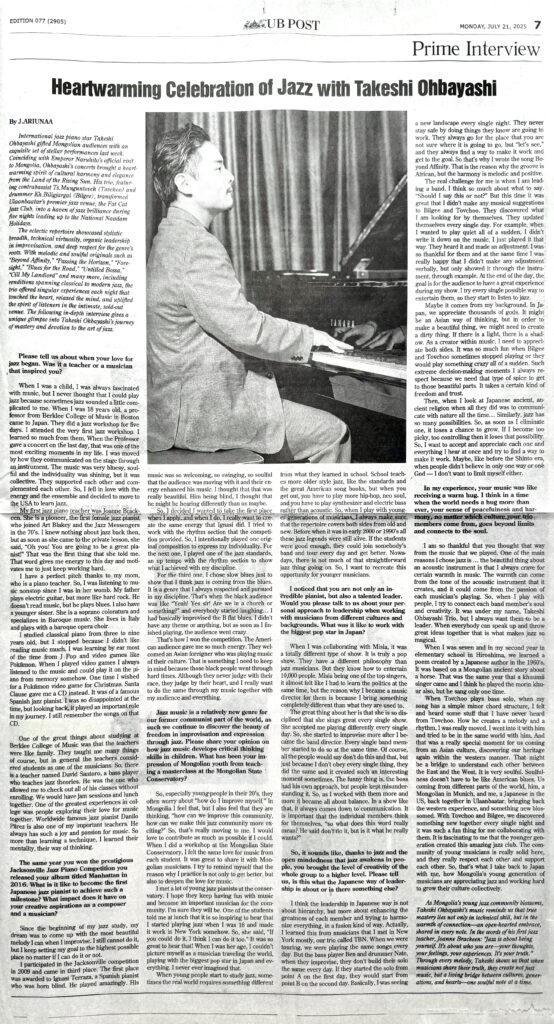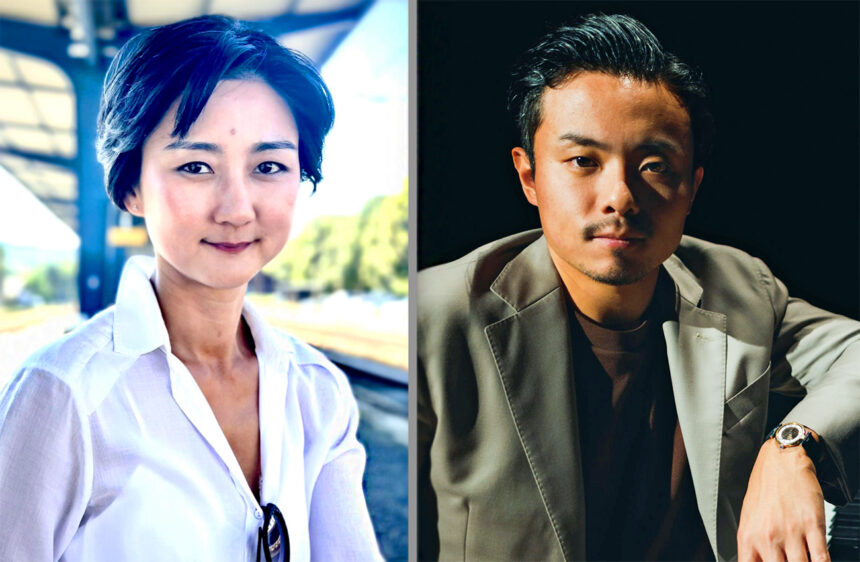International jazz piano star Takeshi Ohbayashi gifted Mongolian audiences with an exquisite set of stellar performances last week. Coinciding with Emperor Naruhito’s official visit to Mongolia, Ohbayashi’s concerts brought a heartwarming spirit of cultural harmony and elegance from the Land of the Rising Sun. His trio, featuring contrabassist Ts. Munguntovch (Tovchoo) and drummer Kh. Biligjargal (Bilgee), transformed Ulaanbaatar’s premier jazz venue, the Fat Cat Jazz Club, into a haven of jazz brilliance during five nights leading up to the National Naadam Holidays.
The eclectic repertoire showcased stylistic breadth, technical virtuosity, organic leadership in improvisation, and deep respect for the genre’s roots. With melodic and soulful originals such as “Beyond Affinity,” “Passing the Horizon,” “Foresight,” “Blues for the Road,” “Untitled Bossa,” “Cill My Landlord” and many more, including renditions spanning classical to modern jazz, the trio offered singular experiences each night that touched the heart, relaxed the mind, and uplifted the spirit of listeners in the intimate, sold-out venue. The following in-depth interview gives a unique glimpse into Takeshi Ohbayashi’s journey of mastery and devotion to the art of jazz.
A.J. Please tell us about when your love for jazz began. Was it a teacher or a musician that inspired you? What experience made you fall in love with jazz?
T.O. When I was a child, I was always fascinated with music, but I never thought that I could play jazz because sometimes jazz sounded a little complicated to me. When I was 18 years old, a professor from Berklee College of Music in Boston came to Japan. They did a jazz workshop for five days. I attended the very first jazz workshop. I had so much fun learning from them. When Professor gave a concert on the last day, that was one of the most exciting moments in my life. I was moved by how they communicated on the stage through an instrument. The music was very bluesy, soulful and the individuality was shining, but it was collective. They supported each other and complemented each other. So, I fell in love with the energy and the ensemble and decided to move to the USA to learn jazz.
My first jazz piano teacher was Joanne Brackeen. She is a pioneer, the first female jazz pianist who joined Art Blakey and the Jazz Messengers in the 70’s. I knew nothing about jazz back then, but as soon as she came to the private lesson, she said, “Oh you! You are going to be a great pianist!” That was the first thing that she told me. That word gives me energy to this day and motivates me to just keep working hard.
I have a perfect pitch thanks to my mom, who is a piano teacher. So, I was listening to music nonstop since I was in her womb. My father plays electric guitar, but more like hard rock. He doesn’t read music, but he plays blues. I also have a younger sister. She is a soprano coloratura and specializes in Baroque music. She lives in Italy and plays with a baroque opera choir.
I studied classical piano from 3 to 9 years old, but I stopped because I didn’t like reading music much. I was learning by ear most of the time from J Pop and video games like Pokémon. When I played video games I always listened to the music and could play it on the piano from memory somehow. One time I wished for a Pokémon video game for Christmas. Santa Clause gave me a CD instead. It was of a famous Spanish jazz pianist. I was so disappointed at the time, but looking back, it played an important role in my journey. I still remember the songs on that CD.
One of the great things about studying at Berklee College of Music was that the teachers were like family. They taught me many things of course, but in general the teachers considered students as one of the musicians. So, there is a teacher named David Santoro, a bass player who teaches jazz theories. He was the one who allowed me to check out all of his classes without enrolling. We would have jam sessions and lunch together. One of the greatest experiences in college was people exploring their love for music together. World famous jazz pianist Danilo Pérez is also one of my important teachers. He always has such a joy and passion for music. So more than learning a technique, I learned their mentality, their way of thinking.
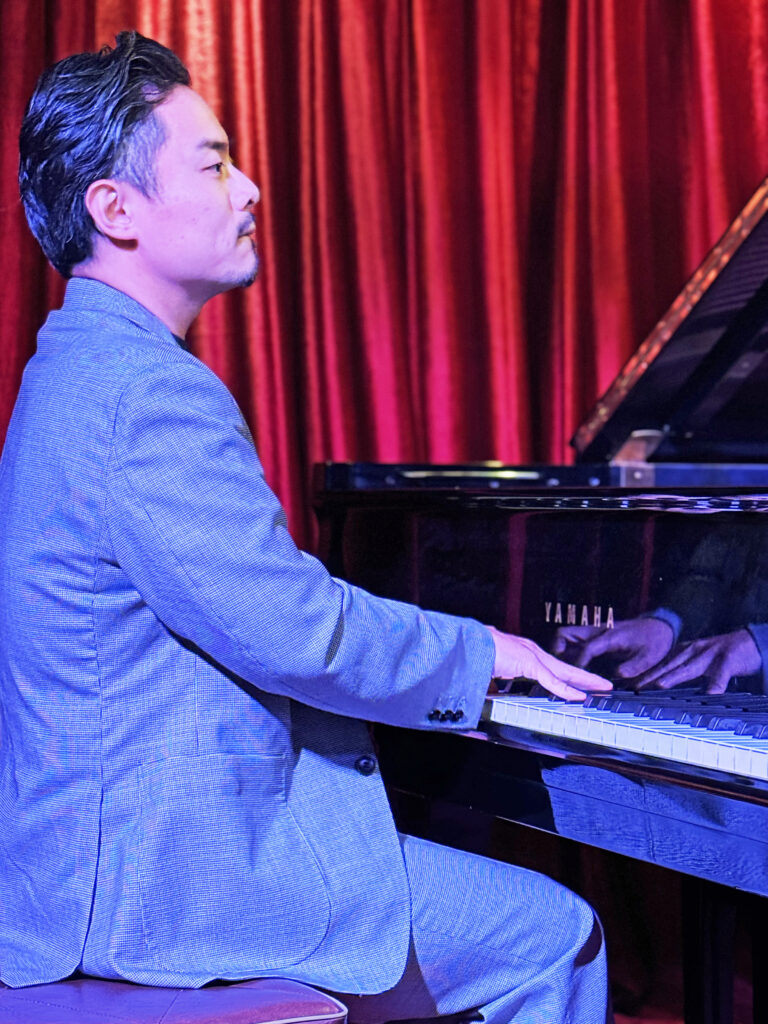
A.J. The same year you won the prestigious Jacksonville Jazz Piano Competition you released your album titled Manhattan in 2016. What is it like to become the first Japanese jazz pianist to achieve such a milestone? What impact does it have on your creative aspirations as a composer and a musician?
T.O. Since the beginning of my jazz study, my dream was to come up with the most beautiful melody I can when I improvise. I still cannot do it, but I keep setting my goal to the highest possible place no matter if I can do it or not.
I participated in the Jacksonville competition in 2009 and came in third place. The first place was awarded to Ignasi Terraza, a Spanish pianist who was born blind. He played amazingly. His music was so welcoming, so swinging, so soulful that the audience was moving with it and their energy enhanced his music. I thought that that was really beautiful. Him being blind, I thought that he might be hearing differently than us maybe.
So, I decided I wanted to take the first place when I apply, and when I do, I really want to create the same energy that Ignasi did. I tried to work with the rhythm section that the competition provided. So, I intentionally played one original composition to express my individuality. For the next one, I played one of the jazz standards, an up-tempo with the rhythm section to show what I achieved with my discipline.
For the third one, I chose slow blues just to show that I think jazz is coming from the blues. It is a genre that I always respected and pursued in my discipline. That’s when the black audience was like “Yeah! Yes sir! Are we in a church or something?” and everybody started laughing… I had basically improvised the B flat blues. I didn’t have any theme or anything, but as soon as I finished playing, the audience went crazy.
That’s how I won the competition. The American audience gave me so much energy. They welcomed an Asian foreigner who was playing music of their culture. That is something I need to keep in mind because those black people went through hard times. Although they never judge with their race, they judge by their heart, and I really want to do the same through my music together with my audience and everything.
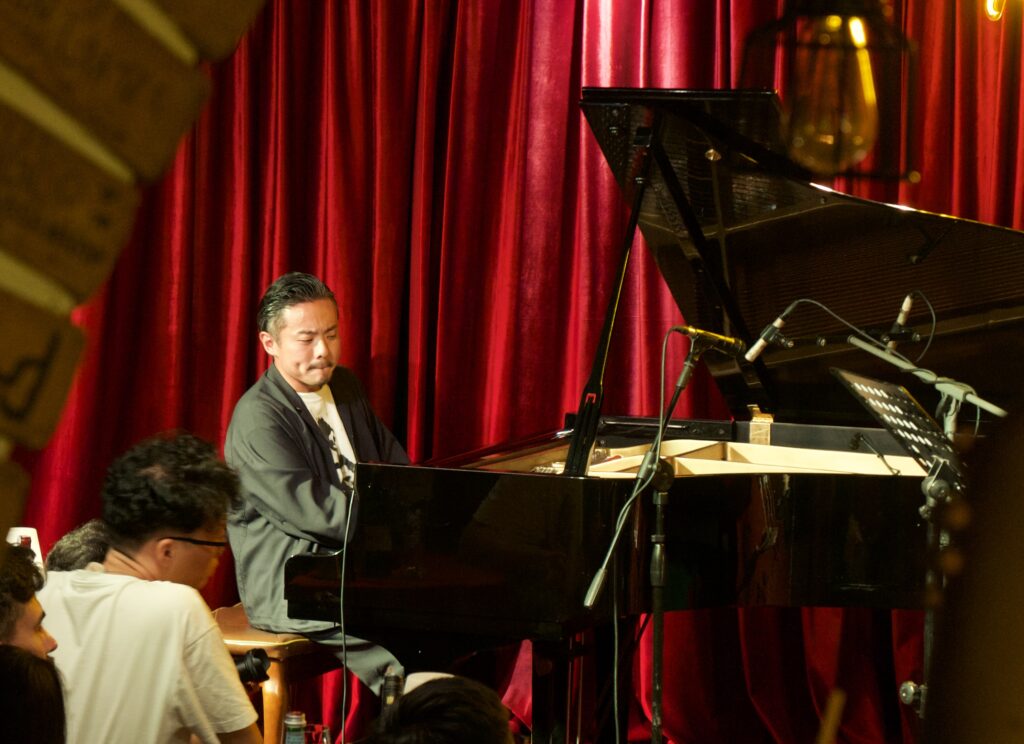
A.J. Jazz music is a relatively new genre for our former communist part of the world, as such we continue to discover the beauty of freedom in improvisation and expression through jazz. Please share your opinion on how jazz music develops critical thinking skills in children. What has been your impression of Mongolian youth from teaching a masterclass at the Mongolian State Conservatory?
T.O. So, especially young people in their 20’s, they often worry about “how do I improve myself.” In Mongolia I feel that, but I also feel that they are thinking, “how can we improve this community, how can we make this jazz community more exciting?” So, that’s really moving to me. I would love to contribute as much as possible if I could. When I did a workshop at the Mongolian State Conservatory, I felt the same love for music from each student. It was great to share it with Mongolian musicians. I try to remind myself that the reason why I practice is not only to get better, but also to deepen the love for the music.
I met a lot of young jazz pianists at the conservatory. I hope they keep having fun with music and become an important musician for the community. I’m sure they will be. One of the students told me at lunch that it is so inspiring to hear that I started playing jazz when I was 18 and made it work in New York somehow. So, she said, “If you could do it, I think I can do it too.” It was so great to hear that! When I was at her age, I couldn’t picture myself as a musician traveling the world, playing with the biggest pop star in Japan and everything. I never ever imagined that.
When young people start to study jazz, sometimes the real world requires something different from what they learned in school. School teaches more older style jazz, like the standards and the Great American Songbooks, but when you get out, you have to play more hip-hop, neo-soul, and you have to play synthesizer and electric bass rather than acoustic. So, when I play with younger generation of musicians, I always make sure that the repertoire covers both sides from old and new. Before when it was in early 2000 or 1990’s all these jazz legends were still alive. If the students were good enough, they could join somebody’s band and tour every day and get better. Nowadays, there is not much of that straightforward jazz thing going on. So, I want to recreate this opportunity for younger musicians.
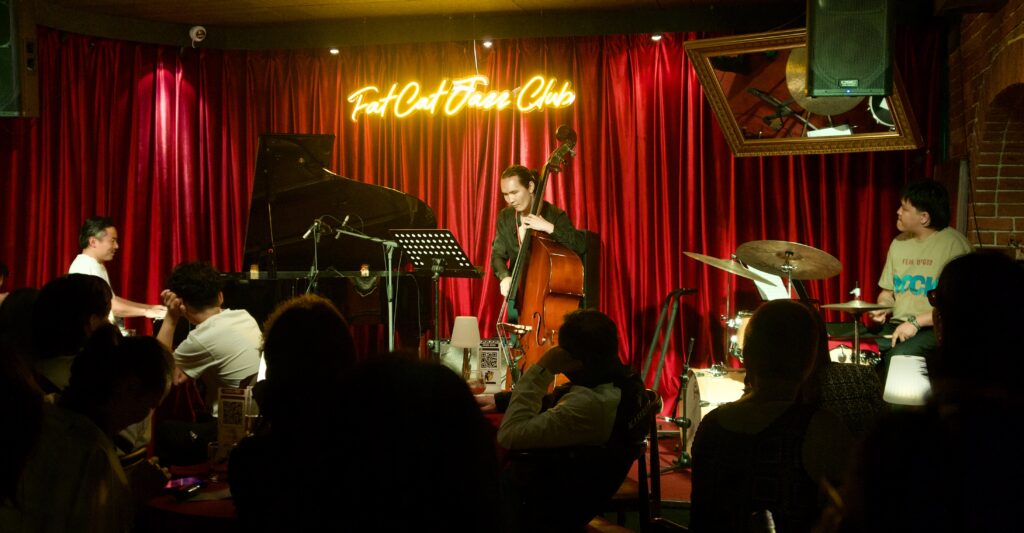
A.J. I noticed that you are not only an incredible pianist, but also a talented leader. Would you please talk to us about your personal approach to leadership when working with musicians from different cultures and backgrounds. What was it like to work with the biggest pop star in Japan?
T.O. When I was collaborating with Misia, it was a totally different type of show. It is truly a pop show. They have a different philosophy than jazz musicians. But they know how to entertain 10,000 people. Misia being one of the top singers, it almost felt like I had to learn the politics at the same time, but the reason why I became a music director for them is because I bring something completely different than what they are used to.
The great thing about her is that she is so disciplined that she sings great every single show. She accepted me playing differently every single day. So, she started to improvise more after I became the band director. Every single band member started to do so at the same time. Of course, all the people would say don’t do this and that, but just because I don’t obey every single thing, they did the same and it created such an interesting moment sometimes. The funny thing is, the boss had his own approach, but people kept misunderstanding it. So, as I worked with them more and more it became all about balance. In a show like that, it always comes down to communication. It is important that the individual members think for themselves, “so what does this word really mean? He said don’t do it, but is it what he really wants?”
A.J. So, it sounds like, thanks to jazz and the open mindedness that jazz awakens in people, you brought the level of creativity of the whole group to a higher level. Please tell us, is this what Japanese way of leadership is about or is there something else?
T.O. I think the leadership in Japanese way is not about hierarchy, but more about enhancing the greatness of each member and trying to harmonize everything, in a fusion kind of way. Actually, I learned this from musicians that I met in New York mostly, our trio called TBN. When we were touring, we were playing same songs every day. But the bass player Ben and drummer Nate, when they improvise, they don’t build their solo the same every day. If they started the solo from point A on the first day, they would start from point B on the second day. Basically, I was seeing a new landscape every single night. They never stay safe by doing things they know are going to work. They always go for the place that you are not sure where it is going to go, but “let’s see,” and they always find a way to make it work and get to the goal. So that’s why I wrote the song Beyond Affinity. That is the reason why the groove is African, but the harmony is melodic and positive.
The real challenge for me is when I am leading a band, I think so much about what to say. “Should I say this or not?” But this time it was great that I didn’t make any musical suggestions to Bilgee and Tovchoo. They discovered what I am looking for by themselves. They updated themselves every single day. For example, when I wanted to play quiet all of a sudden, I didn’t write it down on the music, I just played it that way. They heard it and made an adjustment. I was so thankful for them and at the same time I was really happy that I didn’t make any adjustment verbally, but only showed it through the instrument, through example. At the end of the day, the goal is for the audience to have a great experience during my show. I try every single possible way to entertain them, so they start to listen to jazz.
Maybe it comes from my background. In Japan, we appreciate thousands of gods. It might be an Asian way of thinking, but in order to make a beautiful thing, we might need to create a dirty thing. If there is a light, there is a shadow. As a creator within music, I need to appreciate both sides. It was so much fun when Bilgee and Tovchoo sometimes stopped playing or they would play something crazy all of a sudden. Such extreme decision-making moments I always respect because we need that type of spice to get to those beautiful parts. It takes certain kind of freedom and trust.
Then, when I look at Japanese ancient, ancient religion when all they did was to communicate with nature all the time… Similarly, jazz has so many possibilities. So, as soon as I eliminate one, it loses a chance to grow. If I become too picky, too controlling then it loses that possibility. So, I want to accept and appreciate each one and everything I hear at once and try to find a way to make it work. Maybe, like before the Shinto era, when people didn’t believe in only one way or one God — I don’t want to limit myself either.
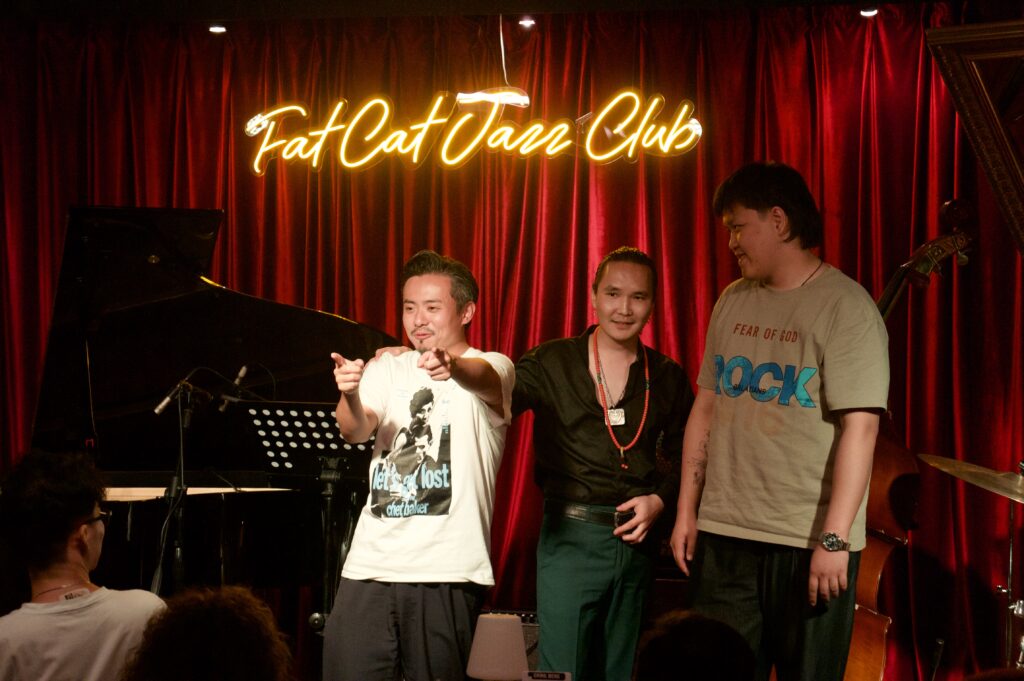
A.J. In my experience, your music was like receiving a warm hug. I think in a time when the world needs a hug more than ever, your sense of peacefulness and harmony, no matter which culture your trio members come from, goes beyond limits and connects to the soul. What impression will you be leaving Mongolia with?
T.O. I am so thankful that you thought that way from the music that we played. One of the main reasons I chose jazz is … the beautiful thing about an acoustic instrument is that I always crave for certain warmth in music. The warmth can come from the tone of the acoustic instrument that it creates, and it could come from the passion of each musician’s playing. So, when I play with people, I try to connect each band member’s soul and creativity. It was under my name, Takeshi Ohbayashi Trio, but I always want them to be a leader. When everybody can speak up and throw great ideas together that is what makes jazz so magical.
When I was 7 and in my second year in elementary school in Hiroshima, we learned a poem created by a Japanese author in the 1960’s. It was based on a Mongolian ancient story about a horse. That was the same year that a khuumii singer came and I think he played the morin khuur also, but he sang only one time.
When Tovchoo plays bass solo, when my song has a simple minor chord structure, I felt and heard some stuff that I have never heard from Tovchoo. How he creates a melody and a rhythm, I was really moved. I went into it with him and tried to be in the same world with him. And that was a really special moment for us coming from an Asian culture, discovering our heritage again within the western manner. That might be a bridge to understand each other between the East and the West. It is very soulful. Soulfulness doesn’t have to be like American blues. Us coming from different parts of the world, him, a Mongolian in Munich, and me, a Japanese in the US, back together in Ulaanbaatar, bringing back the western experience, and something new blossomed. With Tovchoo and Bilgee, we discovered something new together every single night and it was such a fun thing for me collaborating with them.
It is fascinating to me that the younger generation people created this amazing jazz club. The community of young musicians is really solid here, and they really respect each other and support each other. So, that’s what I take back to Japan with me, how Mongolia’s young generation of musicians are appreciating jazz and working hard to grow their culture collectively.
As Mongolia’s young jazz community blossoms, Takeshi Ohbayashi’s music reminds us that true mastery lies not only in technical skill, but in the warmth of connection — an open-hearted embrace, shared in every note. In the words of his first jazz teacher, Joanne Brackeen: “Jazz is about being yourself. It’s about who you are — your thoughts, your feelings, your experiences. It’s your truth.” Through every melody, Takeshi shows us that when musicians share their truth, they create not just music, but a living bridge between cultures, generations, and hearts — one soulful note at a time.
J. Ariunaa
Published in UB Post
July 21, 2025
